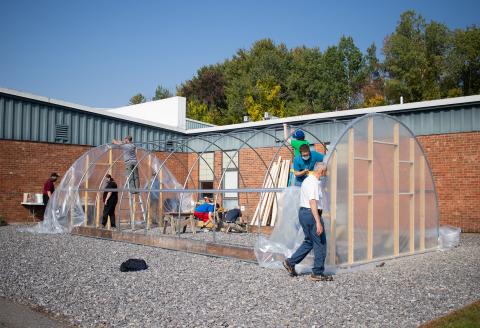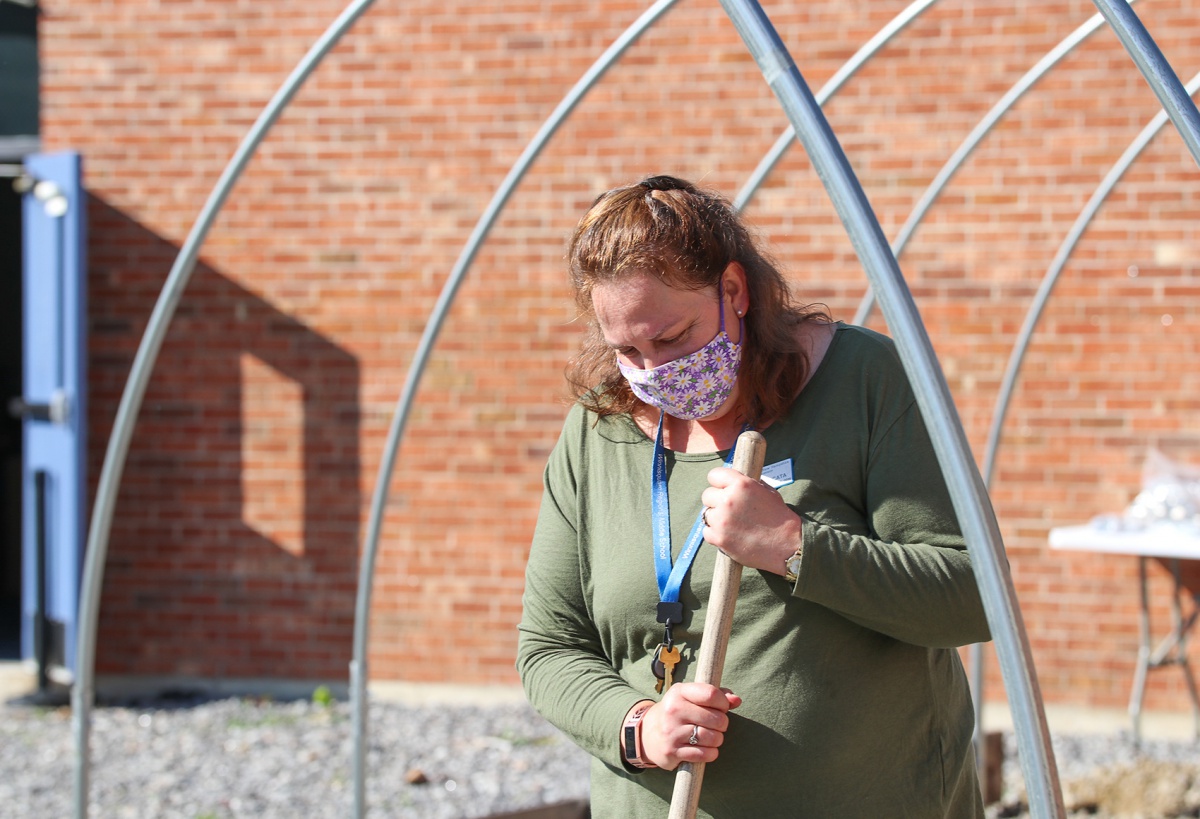With Help from Extension, Hoop House Constructed at Winnisquam Middle School in Tilton

It was a few weekend greenhouse construction workshops, hosted by UNH Cooperative Extension’s Landscape and Greenhouse Field Specialist Jonathan Ebba, that brought to life the structure of a hoop house at Winnisquam Middle School in Tilton, New Hampshire this past September.
Members of the community, school faculty and Extension staff assisted with the construction project that hopes to bring active and hands-on growing programs to students at the middle school. The process hasn’t been easy though, and it started nearly two years ago Winnisquam teachers formed a greenhouse committee.
Sandy Licata, a special education paraprofessional for the school, heard about the struggles the group was going through to move their plans forward. As an alumna of Extension’s 2015 Master Gardener class Licata thought that her connection with UNH Extension could help. That’s when she got in contact with Ebba to organize a workshop to teach people how to build a hoop house.
A hoop house is different than a traditional greenhouse and can be used as a heated structure where plants can be grown in containers on the ground or on benches. It can also act as a “high tunnel” where plants are grown in the ground and it is not heated.

“We’re really thankful to UNH Cooperative Extension because they’ve done a lot and really helped us finish it all up and their resources and education are so valuable,” said Licata.
When a greenhouse is properly utilized by a school, Ebba explained that it could bring forth so many important lessons. He said that along with providing science and industry skills, plants have been shown to have therapeutic benefits for students.
“One great thing about this project was that it accomplished three things,” said Ebba. “It provided the middle school with their greenhouse, it taught members of the community how to construct and cover their own greenhouses and it connected people in the community to the middle school through a UNH program.”
As one of the original members of the committee, Susan Hewey helped to lay the groundwork for a lot of the planning that went into the greenhouse. She said that Licata’s leadership helped make a push in progress for the project.
With the structure now finished, members of the committee have been thinking about different programs that they would like to see implemented throughout the school. They are hopeful to not only incorporate it into students’ curriculum, but also form some after school programs. Licata also expressed interest in getting children in the special education program involved to help them expand communication and collaboration skills.
“We have some intervention groups that we do for reading and math,” said Hewey. “I’m hoping to incorporate greenhouse activities with those kids who are sort of reluctant readers and math students. I think it’s going to be really engaging for them.”
A greenhouse program had already been in place at Winnisquam Regional High School. Since this is the public high school that most children will attend in the area, Licata said that their hoop house could provide a nice transition for students who are interested in continuing this education. Students in the high school’s Ag Center also helped construct the metal frame for the hoop house. While the committee explained they plan to start small and grow into bigger ideas, they are grateful for all the help they have been presented.
“I think one of the beautiful things is there are so many people that have so many different talents in the school, and if you pull all those together then something great is going to happen,” said Licata.
Currently, Winnisquam Middle School has followed a hybrid model for getting students back to school during the pandemic. While COVID-19 has presented setbacks for the committee and their plans, many teachers at the school are still hopeful to get started on implementing new programs within the hoop house.
Deb Burley, another member of the greenhouse committee, explained that there’s a lot of agricultural-focused families in the community and that the pandemic has provided time for children to learn more about gardening from home. She hopes that students can take future education from the hoop house back to their families and eventually into the community.
The group has plans to start planting their first seeds in the spring, but until then they are working on creating a mission statement and website for the hoop house. While many things have been cancelled in the past year, Licata hopes that the growing plants and food in the hoop house will be something that students can look forward to.
Related Resource(s)
Author(s)
- Belknap County Office
- Hillsborough County Office
- Agriculture & Gardens
- Greenhouse, Nursery & Garden Centers
- Yard & Garden
- School Gardening
- New Hampshire Master Gardeners
- Economic and Community Development
- Main Street Resiliency
- Community Leadership
- Health & Well-Being
- Food Access
- Healthy Schools NH
- STEM Education